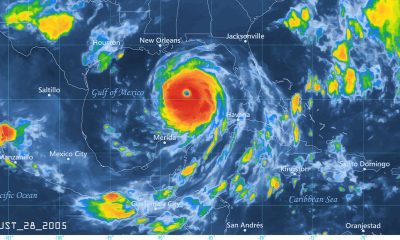Entertainment
Williams and O’Reilly Cases Diverge

This April 4, 2012 file photo shows NBC News’ Brian Williams, at the premiere of the HBO original series “Girls,” in New York. (AP Photo/Starpix, Dave Allocca)
DAVID BAUDER, AP Television Writer
NEW YORK (AP) — Two prominent television personalities are accused within weeks of each other of misrepresenting their wartime reporting experiences in ways that made those experiences seem more dangerous than they actually were.
That’s what Brian Williams and Bill O’Reilly have in common as each man is besieged with questions about his credibility. Most everything else about their episodes diverge, from the responses to the consequences.
NBC News suspended Williams for incorrectly saying he rode in a helicopter hit by an enemy grenade while reporting in Iraq in 2003. O’Reilly, Fox News Channel’s prime-time star, is accused of claiming he had reported in a combat zone for CBS News during the 1982 Falklands War when he was more than a thousand miles from the front.
___
THE ACCUSERS
The charges against Williams came to light when Iraq veterans objected to him telling the story about being on a damaged aircraft on “Nightly News.” Stars & Stripes, the highly-regarded newspaper geared to a military audience, picked up on the complaints and reported them.
The initial story has led to other accusations of exaggerations or outright falsehoods, involving Williams’ reporting on Hurricane Katrina and encounters with Navy SEALS. NBC has an ongoing investigation into his statements, continuing as Williams was taken off “Nightly News” for six months.
The O’Reilly story came to light in a partisan publication, the liberal Mother Jones magazine, enabling its target to immediately label the story a political hit job.
Like in the Williams case, the O’Reilly story has more than one dimension. Some of O’Reilly’s former colleagues also question his claims about saving a bleeding cameraman when he was caught in an anti-government rally in Buenos Aires.
Perhaps due in part to its origins, the O’Reilly story has yet to resonate within the general media landscape as the Williams case has.
___
THE RESPONSE
Caught in a factual mistake that his own previous reporting had contradicted — there’s tape of Williams from shortly after the Iraq incident explaining that it was another plane, not his, that had been hit — Williams apologized, publicly and to his colleagues. He has not addressed the other stories that have circulated about past statements, and has kept mum about his suspension.
Williams’ initial apology fell so flat that he became a punchline, on the Internet, on late-night comedy shows and, most painfully for NBC, at its own “Saturday Night Live” reunion special.
O’Reilly immediately went on the offensive after the Mother Jones story was printed, attacking the publication and its authors in several media interviews. He explained that his use of the term combat zone for reporting at a demonstration was shorthand for saying he was in Argentina covering the war. He has used his show to dispute characterizations that the Buenos Aires demonstration he covered was not dangerous.
He concedes nothing.
Besides attacking the Mother Jones reporters, he’s gotten into an entertaining back-and-forth with former CBS News colleague Eric Engberg, who said O’Reilly was “completely nutty” after the Fox News host said Engberg was more interested in covering the conflict from the safety of his hotel room.
And on Tuesday, The New York Times quoted O’Reilly’s blunt warning to reporters working on a story about him if he felt their coverage was inappropriate.
“I am coming after you with everything I have,” O’Reilly said. “You can take it as a threat.”
___
THE EMPLOYERS
With Williams both the anchor and managing editor for the top-rated network evening newscast, NBC took the accusations as a very real threat to the credibility of the entire news organization.
NBC executives say they’re rooting for Williams’ return. But the suspension is so severe that many have likened it to a professional death penalty, wondering if Williams can ever make it back to such a prominent respected position.
“The aura of credibility that NBC nurtured and paid tens of millions of dollars for is gone with Brian Williams and I don’t think you’ll ever restore that, even with an apology tour,” said Mark Feldstein, a journalism professor at the University of Maryland.
For all his entertaining turns on talk shows, NBC is paying Williams to be a journalist who is expected to be fair and, above all, truthful.
Fox News, through its chairman and CEO Roger Ailes, has issued a statement of support for its prime-time star.
Although O’Reilly was working as a reporter in Argentina in 1982, he leads an opinion-based show for a combative audience that often feels its star is a target by liberal media members and cultural arbiters. With the accusations against him that are already on the table, O’Reilly is in no danger of losing his job, said Jay Rosen, New York University professor and author of the “Pressthink” blog.
Fox and its fans relish the fight, Rosen said.
“I think he would be in danger if he apologized,” he said.
___
Follow David Bauder at twitter.com/dbauder. His work can be found at http://bigstory.ap.org/content/david-bauder
Copyright 2015 The Associated Press. All rights reserved. This material may not be published, broadcast, rewritten or redistributed.
Activism
Oakland Post: Week of December 10 – 16, 2025
The printed Weekly Edition of the Oakland Post: Week of – December 10 – 16, 2025

To enlarge your view of this issue, use the slider, magnifying glass icon or full page icon in the lower right corner of the browser window.
Alameda County
Seth Curry Makes Impressive Debut with the Golden State Warriors
Seth looked comfortable in his new uniform, seamlessly fitting into the Warriors’ offensive and defensive system. He finished the night with an impressive 14 points, becoming one of the team’s top scorers for the game. Seth’s points came in a variety of ways – floaters, spot-up three-pointers, mid-range jumpers, and a handful of aggressive drives that kept the Oklahoma City Thunder defense on its heels.

By Y’Anad Burrell
Tuesday night was anything but ordinary for fans in San Francisco as Seth Curry made his highly anticipated debut as a new member of the Golden State Warriors. Seth didn’t disappoint, delivering a performance that not only showcased his scoring ability but also demonstrated his added value to the team.
At 35, the 12-year NBA veteran on Monday signed a contract to play with the Warriors for the rest of the season.
Seth looked comfortable in his new uniform, seamlessly fitting into the Warriors’ offensive and defensive system. He finished the night with an impressive 14 points, becoming one of the team’s top scorers for the game. Seth’s points came in a variety of ways – floaters, spot-up three-pointers, mid-range jumpers, and a handful of aggressive drives that kept the Oklahoma City Thunder defense on its heels.
One of the most memorable moments of the evening came before Seth even scored his first points. As he checked into the game, the Chase Center erupted into applause, with fans rising to their feet to give the newest Warrior a standing ovation.
The crowd’s reaction was a testament not only to Seth’s reputation as a sharpshooter but also to the excitement he brings to the Warriors. It was clear that fans quickly embraced Seth as one of their own, eager to see what he could bring to the team’s championship aspirations.
Warriors’ superstar Steph Curry – Seth’s brother – did not play due to an injury. One could only imagine what it would be like if the Curry brothers were on the court together. Magic in the making.
Seth’s debut proved to be a turning point for the Warriors. Not only did he contribute on the scoreboard, but he also brought a sense of confidence and composure to the floor.
While their loss last night, OKC 124 – GSW 112, Seth’s impact was a game-changer and there’s more yet to come. Beyond statistics, it was clear that Seth’s presence elevated the team’s performance, giving the Warriors a new force as they look to make a deep playoff run.
Activism
Oakland Post: Week of November 26 – December 2, 2025
The printed Weekly Edition of the Oakland Post: Week of November 26 – December 2, 2025

To enlarge your view of this issue, use the slider, magnifying glass icon or full page icon in the lower right corner of the browser window.
-

 Activism4 weeks ago
Activism4 weeks agoOakland Post: Week of November 12 – 18, 2025
-

 Activism3 weeks ago
Activism3 weeks agoIN MEMORIAM: William ‘Bill’ Patterson, 94
-

 Activism4 weeks ago
Activism4 weeks agoHow Charles R. Drew University Navigated More Than $20 Million in Fed Cuts – Still Prioritizing Students and Community Health
-

 Bay Area4 weeks ago
Bay Area4 weeks agoNo Justice in the Justice System
-

 #NNPA BlackPress3 weeks ago
#NNPA BlackPress3 weeks agoBeyoncé and Jay-Z make rare public appearance with Lewis Hamilton at Las Vegas Grand Prix
-

 #NNPA BlackPress3 weeks ago
#NNPA BlackPress3 weeks agoLewis Hamilton set to start LAST in Saturday Night’s Las Vegas Grand Prix
-

 Activism3 weeks ago
Activism3 weeks agoOakland Post: Week of November 19 – 25, 2025
-

 #NNPA BlackPress4 weeks ago
#NNPA BlackPress4 weeks agoThe Perfumed Hand of Hypocrisy: Trump Hosted Former Terror Suspect While America Condemns a Muslim Mayor














































